Karl Marx on Political Philosophy: Examining Key Concepts
VerifiedAdded on 2023/05/30
|9
|2483
|456
Essay
AI Summary
This essay delves into the political philosophy of Karl Marx, a 19th-century radical thinker known for his advocacy of communism. The essay traces Marx's intellectual development, influenced by Hegelian thought, and his critique of capitalist power structures that led to worker exploitation and alienation. It examines Marx's theories of dialectical and historical materialism, class struggle, and the evolution of society through stages like primitive communism, feudalism, capitalism, and the dictatorship of the proletariat, ultimately leading to a stateless communist society. The essay also addresses criticisms of Marxian philosophy, highlighting its idealistic nature while acknowledging its emphasis on economic conditions and the equal distribution of resources. The document is available on Desklib, a platform offering a wide array of study tools and solved assignments for students.
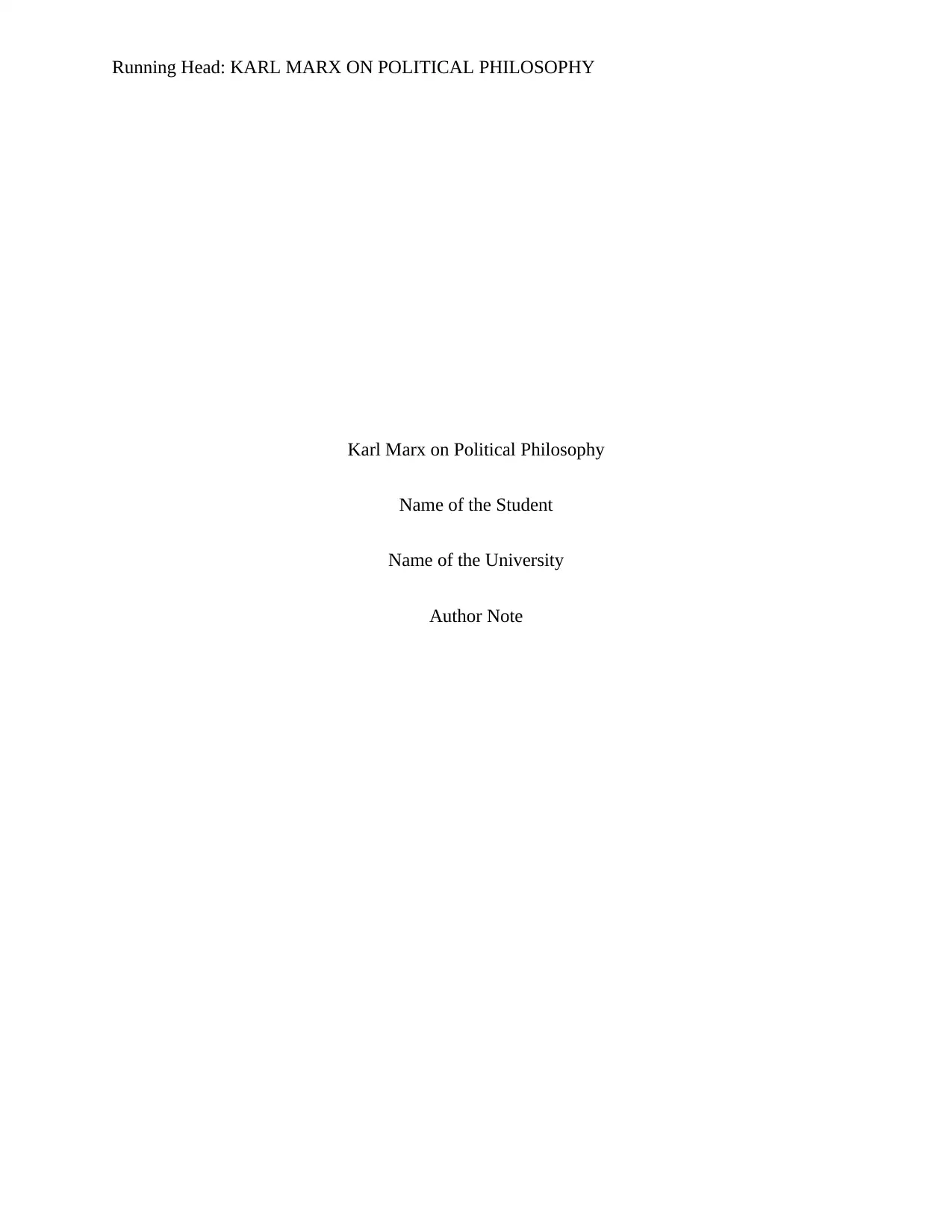
Running Head: KARL MARX ON POLITICAL PHILOSOPHY
Karl Marx on Political Philosophy
Name of the Student
Name of the University
Author Note
Karl Marx on Political Philosophy
Name of the Student
Name of the University
Author Note
Paraphrase This Document
Need a fresh take? Get an instant paraphrase of this document with our AI Paraphraser
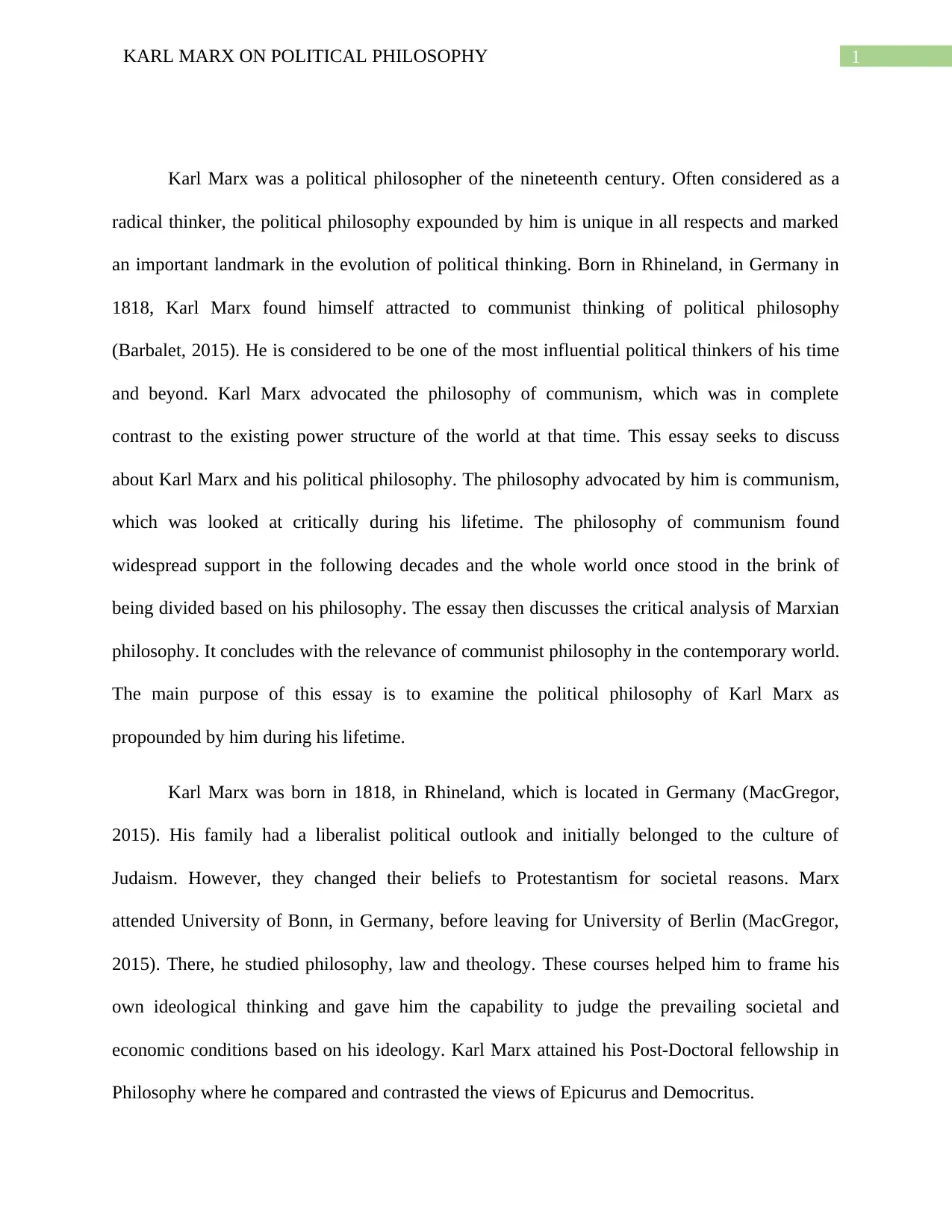
1KARL MARX ON POLITICAL PHILOSOPHY
Karl Marx was a political philosopher of the nineteenth century. Often considered as a
radical thinker, the political philosophy expounded by him is unique in all respects and marked
an important landmark in the evolution of political thinking. Born in Rhineland, in Germany in
1818, Karl Marx found himself attracted to communist thinking of political philosophy
(Barbalet, 2015). He is considered to be one of the most influential political thinkers of his time
and beyond. Karl Marx advocated the philosophy of communism, which was in complete
contrast to the existing power structure of the world at that time. This essay seeks to discuss
about Karl Marx and his political philosophy. The philosophy advocated by him is communism,
which was looked at critically during his lifetime. The philosophy of communism found
widespread support in the following decades and the whole world once stood in the brink of
being divided based on his philosophy. The essay then discusses the critical analysis of Marxian
philosophy. It concludes with the relevance of communist philosophy in the contemporary world.
The main purpose of this essay is to examine the political philosophy of Karl Marx as
propounded by him during his lifetime.
Karl Marx was born in 1818, in Rhineland, which is located in Germany (MacGregor,
2015). His family had a liberalist political outlook and initially belonged to the culture of
Judaism. However, they changed their beliefs to Protestantism for societal reasons. Marx
attended University of Bonn, in Germany, before leaving for University of Berlin (MacGregor,
2015). There, he studied philosophy, law and theology. These courses helped him to frame his
own ideological thinking and gave him the capability to judge the prevailing societal and
economic conditions based on his ideology. Karl Marx attained his Post-Doctoral fellowship in
Philosophy where he compared and contrasted the views of Epicurus and Democritus.
Karl Marx was a political philosopher of the nineteenth century. Often considered as a
radical thinker, the political philosophy expounded by him is unique in all respects and marked
an important landmark in the evolution of political thinking. Born in Rhineland, in Germany in
1818, Karl Marx found himself attracted to communist thinking of political philosophy
(Barbalet, 2015). He is considered to be one of the most influential political thinkers of his time
and beyond. Karl Marx advocated the philosophy of communism, which was in complete
contrast to the existing power structure of the world at that time. This essay seeks to discuss
about Karl Marx and his political philosophy. The philosophy advocated by him is communism,
which was looked at critically during his lifetime. The philosophy of communism found
widespread support in the following decades and the whole world once stood in the brink of
being divided based on his philosophy. The essay then discusses the critical analysis of Marxian
philosophy. It concludes with the relevance of communist philosophy in the contemporary world.
The main purpose of this essay is to examine the political philosophy of Karl Marx as
propounded by him during his lifetime.
Karl Marx was born in 1818, in Rhineland, which is located in Germany (MacGregor,
2015). His family had a liberalist political outlook and initially belonged to the culture of
Judaism. However, they changed their beliefs to Protestantism for societal reasons. Marx
attended University of Bonn, in Germany, before leaving for University of Berlin (MacGregor,
2015). There, he studied philosophy, law and theology. These courses helped him to frame his
own ideological thinking and gave him the capability to judge the prevailing societal and
economic conditions based on his ideology. Karl Marx attained his Post-Doctoral fellowship in
Philosophy where he compared and contrasted the views of Epicurus and Democritus.
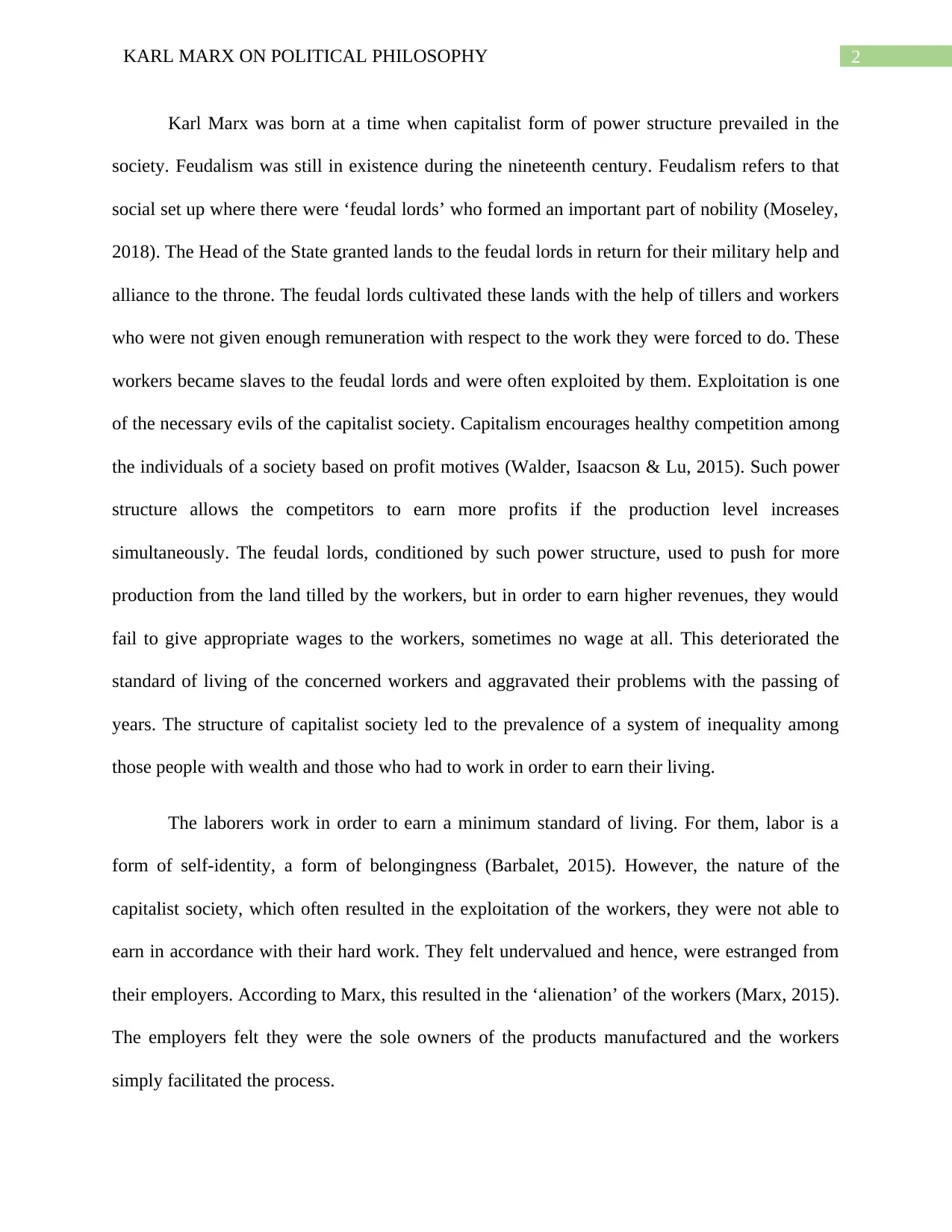
2KARL MARX ON POLITICAL PHILOSOPHY
Karl Marx was born at a time when capitalist form of power structure prevailed in the
society. Feudalism was still in existence during the nineteenth century. Feudalism refers to that
social set up where there were ‘feudal lords’ who formed an important part of nobility (Moseley,
2018). The Head of the State granted lands to the feudal lords in return for their military help and
alliance to the throne. The feudal lords cultivated these lands with the help of tillers and workers
who were not given enough remuneration with respect to the work they were forced to do. These
workers became slaves to the feudal lords and were often exploited by them. Exploitation is one
of the necessary evils of the capitalist society. Capitalism encourages healthy competition among
the individuals of a society based on profit motives (Walder, Isaacson & Lu, 2015). Such power
structure allows the competitors to earn more profits if the production level increases
simultaneously. The feudal lords, conditioned by such power structure, used to push for more
production from the land tilled by the workers, but in order to earn higher revenues, they would
fail to give appropriate wages to the workers, sometimes no wage at all. This deteriorated the
standard of living of the concerned workers and aggravated their problems with the passing of
years. The structure of capitalist society led to the prevalence of a system of inequality among
those people with wealth and those who had to work in order to earn their living.
The laborers work in order to earn a minimum standard of living. For them, labor is a
form of self-identity, a form of belongingness (Barbalet, 2015). However, the nature of the
capitalist society, which often resulted in the exploitation of the workers, they were not able to
earn in accordance with their hard work. They felt undervalued and hence, were estranged from
their employers. According to Marx, this resulted in the ‘alienation’ of the workers (Marx, 2015).
The employers felt they were the sole owners of the products manufactured and the workers
simply facilitated the process.
Karl Marx was born at a time when capitalist form of power structure prevailed in the
society. Feudalism was still in existence during the nineteenth century. Feudalism refers to that
social set up where there were ‘feudal lords’ who formed an important part of nobility (Moseley,
2018). The Head of the State granted lands to the feudal lords in return for their military help and
alliance to the throne. The feudal lords cultivated these lands with the help of tillers and workers
who were not given enough remuneration with respect to the work they were forced to do. These
workers became slaves to the feudal lords and were often exploited by them. Exploitation is one
of the necessary evils of the capitalist society. Capitalism encourages healthy competition among
the individuals of a society based on profit motives (Walder, Isaacson & Lu, 2015). Such power
structure allows the competitors to earn more profits if the production level increases
simultaneously. The feudal lords, conditioned by such power structure, used to push for more
production from the land tilled by the workers, but in order to earn higher revenues, they would
fail to give appropriate wages to the workers, sometimes no wage at all. This deteriorated the
standard of living of the concerned workers and aggravated their problems with the passing of
years. The structure of capitalist society led to the prevalence of a system of inequality among
those people with wealth and those who had to work in order to earn their living.
The laborers work in order to earn a minimum standard of living. For them, labor is a
form of self-identity, a form of belongingness (Barbalet, 2015). However, the nature of the
capitalist society, which often resulted in the exploitation of the workers, they were not able to
earn in accordance with their hard work. They felt undervalued and hence, were estranged from
their employers. According to Marx, this resulted in the ‘alienation’ of the workers (Marx, 2015).
The employers felt they were the sole owners of the products manufactured and the workers
simply facilitated the process.
⊘ This is a preview!⊘
Do you want full access?
Subscribe today to unlock all pages.

Trusted by 1+ million students worldwide
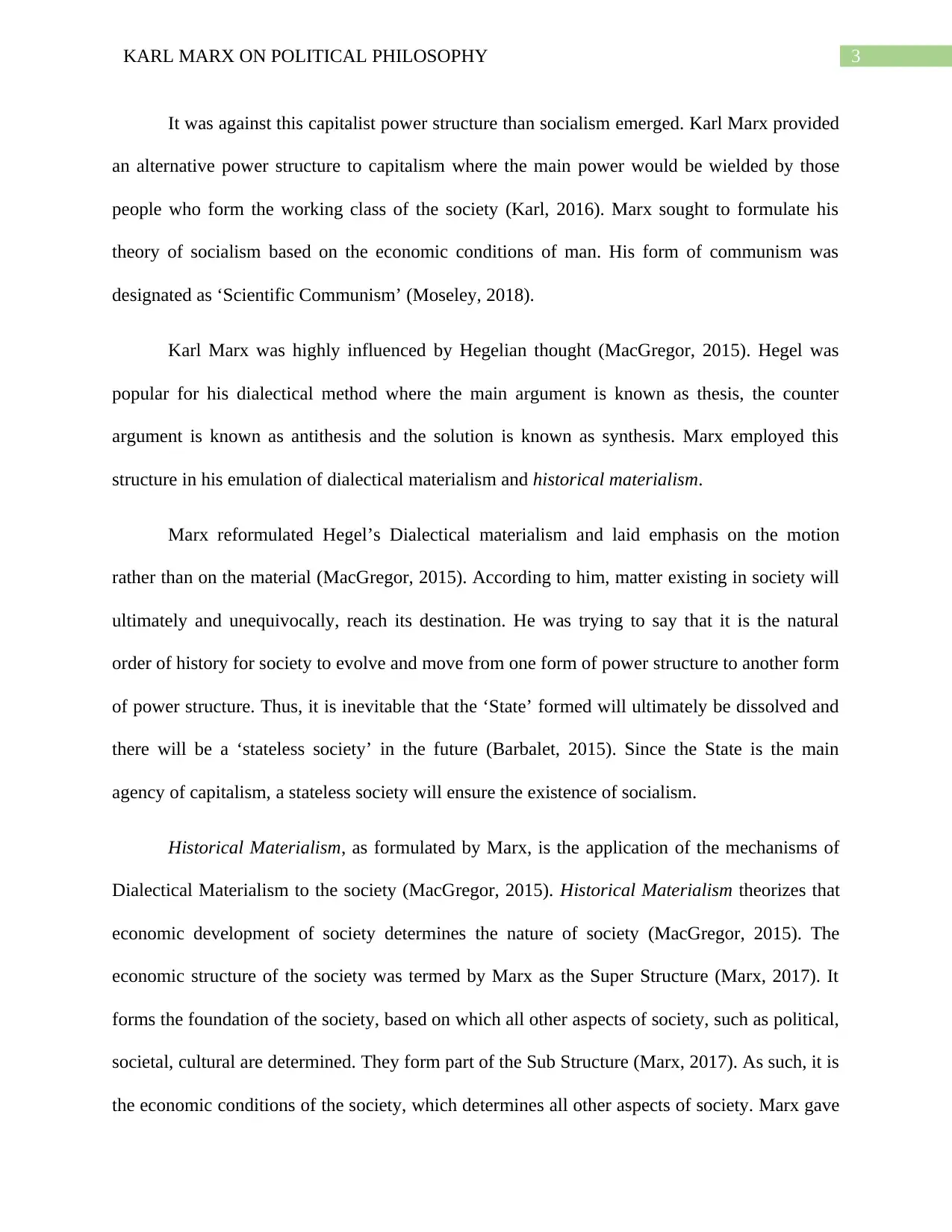
3KARL MARX ON POLITICAL PHILOSOPHY
It was against this capitalist power structure than socialism emerged. Karl Marx provided
an alternative power structure to capitalism where the main power would be wielded by those
people who form the working class of the society (Karl, 2016). Marx sought to formulate his
theory of socialism based on the economic conditions of man. His form of communism was
designated as ‘Scientific Communism’ (Moseley, 2018).
Karl Marx was highly influenced by Hegelian thought (MacGregor, 2015). Hegel was
popular for his dialectical method where the main argument is known as thesis, the counter
argument is known as antithesis and the solution is known as synthesis. Marx employed this
structure in his emulation of dialectical materialism and historical materialism.
Marx reformulated Hegel’s Dialectical materialism and laid emphasis on the motion
rather than on the material (MacGregor, 2015). According to him, matter existing in society will
ultimately and unequivocally, reach its destination. He was trying to say that it is the natural
order of history for society to evolve and move from one form of power structure to another form
of power structure. Thus, it is inevitable that the ‘State’ formed will ultimately be dissolved and
there will be a ‘stateless society’ in the future (Barbalet, 2015). Since the State is the main
agency of capitalism, a stateless society will ensure the existence of socialism.
Historical Materialism, as formulated by Marx, is the application of the mechanisms of
Dialectical Materialism to the society (MacGregor, 2015). Historical Materialism theorizes that
economic development of society determines the nature of society (MacGregor, 2015). The
economic structure of the society was termed by Marx as the Super Structure (Marx, 2017). It
forms the foundation of the society, based on which all other aspects of society, such as political,
societal, cultural are determined. They form part of the Sub Structure (Marx, 2017). As such, it is
the economic conditions of the society, which determines all other aspects of society. Marx gave
It was against this capitalist power structure than socialism emerged. Karl Marx provided
an alternative power structure to capitalism where the main power would be wielded by those
people who form the working class of the society (Karl, 2016). Marx sought to formulate his
theory of socialism based on the economic conditions of man. His form of communism was
designated as ‘Scientific Communism’ (Moseley, 2018).
Karl Marx was highly influenced by Hegelian thought (MacGregor, 2015). Hegel was
popular for his dialectical method where the main argument is known as thesis, the counter
argument is known as antithesis and the solution is known as synthesis. Marx employed this
structure in his emulation of dialectical materialism and historical materialism.
Marx reformulated Hegel’s Dialectical materialism and laid emphasis on the motion
rather than on the material (MacGregor, 2015). According to him, matter existing in society will
ultimately and unequivocally, reach its destination. He was trying to say that it is the natural
order of history for society to evolve and move from one form of power structure to another form
of power structure. Thus, it is inevitable that the ‘State’ formed will ultimately be dissolved and
there will be a ‘stateless society’ in the future (Barbalet, 2015). Since the State is the main
agency of capitalism, a stateless society will ensure the existence of socialism.
Historical Materialism, as formulated by Marx, is the application of the mechanisms of
Dialectical Materialism to the society (MacGregor, 2015). Historical Materialism theorizes that
economic development of society determines the nature of society (MacGregor, 2015). The
economic structure of the society was termed by Marx as the Super Structure (Marx, 2017). It
forms the foundation of the society, based on which all other aspects of society, such as political,
societal, cultural are determined. They form part of the Sub Structure (Marx, 2017). As such, it is
the economic conditions of the society, which determines all other aspects of society. Marx gave
Paraphrase This Document
Need a fresh take? Get an instant paraphrase of this document with our AI Paraphraser
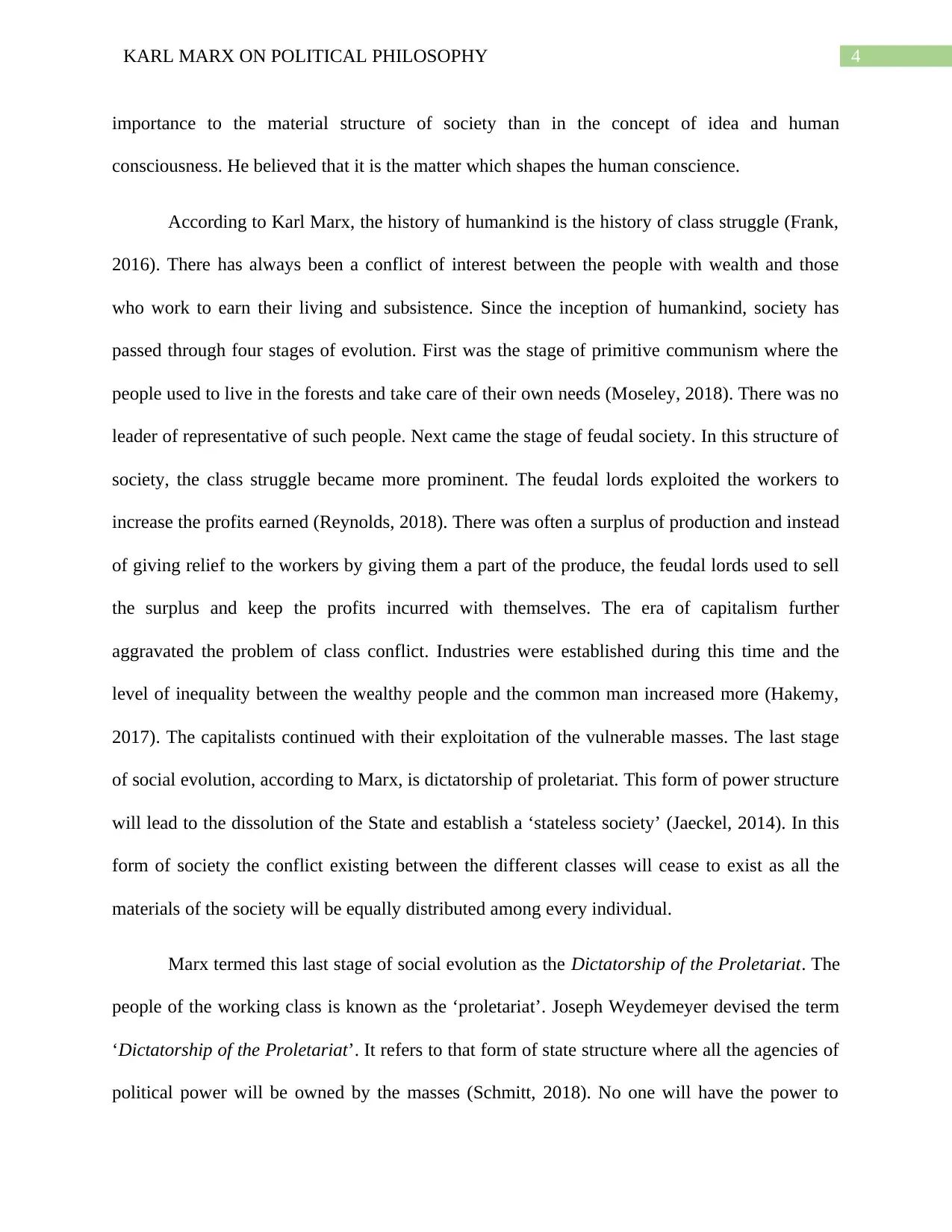
4KARL MARX ON POLITICAL PHILOSOPHY
importance to the material structure of society than in the concept of idea and human
consciousness. He believed that it is the matter which shapes the human conscience.
According to Karl Marx, the history of humankind is the history of class struggle (Frank,
2016). There has always been a conflict of interest between the people with wealth and those
who work to earn their living and subsistence. Since the inception of humankind, society has
passed through four stages of evolution. First was the stage of primitive communism where the
people used to live in the forests and take care of their own needs (Moseley, 2018). There was no
leader of representative of such people. Next came the stage of feudal society. In this structure of
society, the class struggle became more prominent. The feudal lords exploited the workers to
increase the profits earned (Reynolds, 2018). There was often a surplus of production and instead
of giving relief to the workers by giving them a part of the produce, the feudal lords used to sell
the surplus and keep the profits incurred with themselves. The era of capitalism further
aggravated the problem of class conflict. Industries were established during this time and the
level of inequality between the wealthy people and the common man increased more (Hakemy,
2017). The capitalists continued with their exploitation of the vulnerable masses. The last stage
of social evolution, according to Marx, is dictatorship of proletariat. This form of power structure
will lead to the dissolution of the State and establish a ‘stateless society’ (Jaeckel, 2014). In this
form of society the conflict existing between the different classes will cease to exist as all the
materials of the society will be equally distributed among every individual.
Marx termed this last stage of social evolution as the Dictatorship of the Proletariat. The
people of the working class is known as the ‘proletariat’. Joseph Weydemeyer devised the term
‘Dictatorship of the Proletariat’. It refers to that form of state structure where all the agencies of
political power will be owned by the masses (Schmitt, 2018). No one will have the power to
importance to the material structure of society than in the concept of idea and human
consciousness. He believed that it is the matter which shapes the human conscience.
According to Karl Marx, the history of humankind is the history of class struggle (Frank,
2016). There has always been a conflict of interest between the people with wealth and those
who work to earn their living and subsistence. Since the inception of humankind, society has
passed through four stages of evolution. First was the stage of primitive communism where the
people used to live in the forests and take care of their own needs (Moseley, 2018). There was no
leader of representative of such people. Next came the stage of feudal society. In this structure of
society, the class struggle became more prominent. The feudal lords exploited the workers to
increase the profits earned (Reynolds, 2018). There was often a surplus of production and instead
of giving relief to the workers by giving them a part of the produce, the feudal lords used to sell
the surplus and keep the profits incurred with themselves. The era of capitalism further
aggravated the problem of class conflict. Industries were established during this time and the
level of inequality between the wealthy people and the common man increased more (Hakemy,
2017). The capitalists continued with their exploitation of the vulnerable masses. The last stage
of social evolution, according to Marx, is dictatorship of proletariat. This form of power structure
will lead to the dissolution of the State and establish a ‘stateless society’ (Jaeckel, 2014). In this
form of society the conflict existing between the different classes will cease to exist as all the
materials of the society will be equally distributed among every individual.
Marx termed this last stage of social evolution as the Dictatorship of the Proletariat. The
people of the working class is known as the ‘proletariat’. Joseph Weydemeyer devised the term
‘Dictatorship of the Proletariat’. It refers to that form of state structure where all the agencies of
political power will be owned by the masses (Schmitt, 2018). No one will have the power to
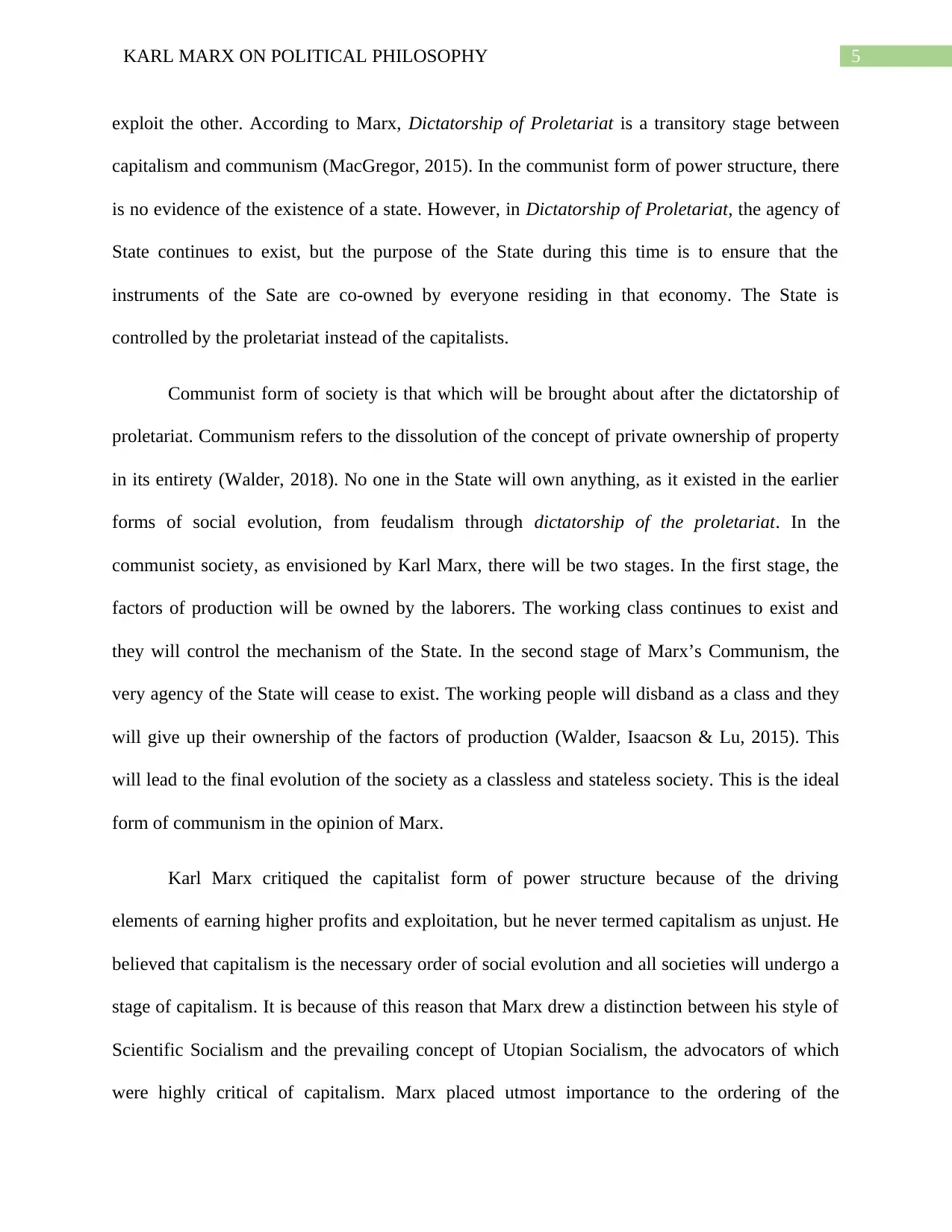
5KARL MARX ON POLITICAL PHILOSOPHY
exploit the other. According to Marx, Dictatorship of Proletariat is a transitory stage between
capitalism and communism (MacGregor, 2015). In the communist form of power structure, there
is no evidence of the existence of a state. However, in Dictatorship of Proletariat, the agency of
State continues to exist, but the purpose of the State during this time is to ensure that the
instruments of the Sate are co-owned by everyone residing in that economy. The State is
controlled by the proletariat instead of the capitalists.
Communist form of society is that which will be brought about after the dictatorship of
proletariat. Communism refers to the dissolution of the concept of private ownership of property
in its entirety (Walder, 2018). No one in the State will own anything, as it existed in the earlier
forms of social evolution, from feudalism through dictatorship of the proletariat. In the
communist society, as envisioned by Karl Marx, there will be two stages. In the first stage, the
factors of production will be owned by the laborers. The working class continues to exist and
they will control the mechanism of the State. In the second stage of Marx’s Communism, the
very agency of the State will cease to exist. The working people will disband as a class and they
will give up their ownership of the factors of production (Walder, Isaacson & Lu, 2015). This
will lead to the final evolution of the society as a classless and stateless society. This is the ideal
form of communism in the opinion of Marx.
Karl Marx critiqued the capitalist form of power structure because of the driving
elements of earning higher profits and exploitation, but he never termed capitalism as unjust. He
believed that capitalism is the necessary order of social evolution and all societies will undergo a
stage of capitalism. It is because of this reason that Marx drew a distinction between his style of
Scientific Socialism and the prevailing concept of Utopian Socialism, the advocators of which
were highly critical of capitalism. Marx placed utmost importance to the ordering of the
exploit the other. According to Marx, Dictatorship of Proletariat is a transitory stage between
capitalism and communism (MacGregor, 2015). In the communist form of power structure, there
is no evidence of the existence of a state. However, in Dictatorship of Proletariat, the agency of
State continues to exist, but the purpose of the State during this time is to ensure that the
instruments of the Sate are co-owned by everyone residing in that economy. The State is
controlled by the proletariat instead of the capitalists.
Communist form of society is that which will be brought about after the dictatorship of
proletariat. Communism refers to the dissolution of the concept of private ownership of property
in its entirety (Walder, 2018). No one in the State will own anything, as it existed in the earlier
forms of social evolution, from feudalism through dictatorship of the proletariat. In the
communist society, as envisioned by Karl Marx, there will be two stages. In the first stage, the
factors of production will be owned by the laborers. The working class continues to exist and
they will control the mechanism of the State. In the second stage of Marx’s Communism, the
very agency of the State will cease to exist. The working people will disband as a class and they
will give up their ownership of the factors of production (Walder, Isaacson & Lu, 2015). This
will lead to the final evolution of the society as a classless and stateless society. This is the ideal
form of communism in the opinion of Marx.
Karl Marx critiqued the capitalist form of power structure because of the driving
elements of earning higher profits and exploitation, but he never termed capitalism as unjust. He
believed that capitalism is the necessary order of social evolution and all societies will undergo a
stage of capitalism. It is because of this reason that Marx drew a distinction between his style of
Scientific Socialism and the prevailing concept of Utopian Socialism, the advocators of which
were highly critical of capitalism. Marx placed utmost importance to the ordering of the
⊘ This is a preview!⊘
Do you want full access?
Subscribe today to unlock all pages.

Trusted by 1+ million students worldwide
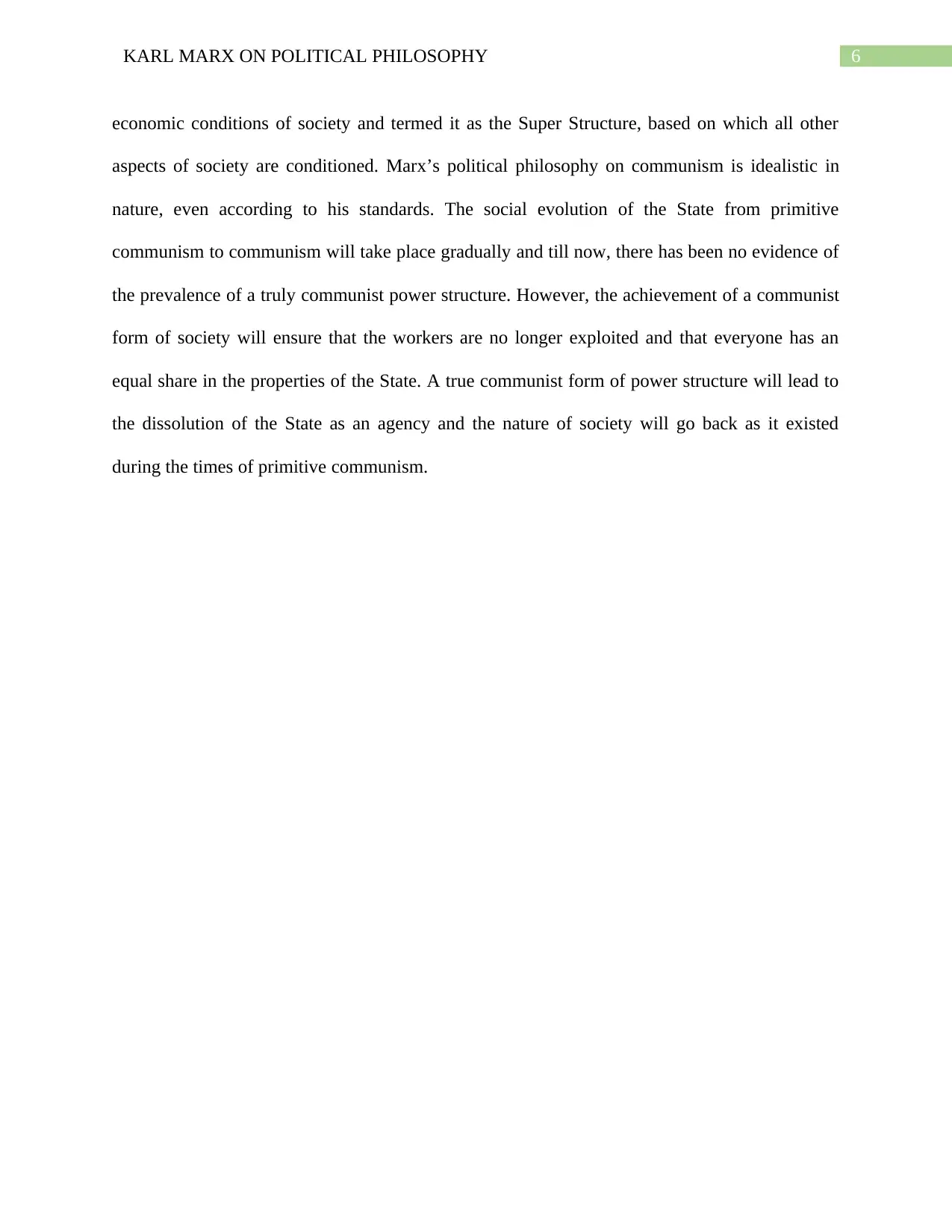
6KARL MARX ON POLITICAL PHILOSOPHY
economic conditions of society and termed it as the Super Structure, based on which all other
aspects of society are conditioned. Marx’s political philosophy on communism is idealistic in
nature, even according to his standards. The social evolution of the State from primitive
communism to communism will take place gradually and till now, there has been no evidence of
the prevalence of a truly communist power structure. However, the achievement of a communist
form of society will ensure that the workers are no longer exploited and that everyone has an
equal share in the properties of the State. A true communist form of power structure will lead to
the dissolution of the State as an agency and the nature of society will go back as it existed
during the times of primitive communism.
economic conditions of society and termed it as the Super Structure, based on which all other
aspects of society are conditioned. Marx’s political philosophy on communism is idealistic in
nature, even according to his standards. The social evolution of the State from primitive
communism to communism will take place gradually and till now, there has been no evidence of
the prevalence of a truly communist power structure. However, the achievement of a communist
form of society will ensure that the workers are no longer exploited and that everyone has an
equal share in the properties of the State. A true communist form of power structure will lead to
the dissolution of the State as an agency and the nature of society will go back as it existed
during the times of primitive communism.
Paraphrase This Document
Need a fresh take? Get an instant paraphrase of this document with our AI Paraphraser
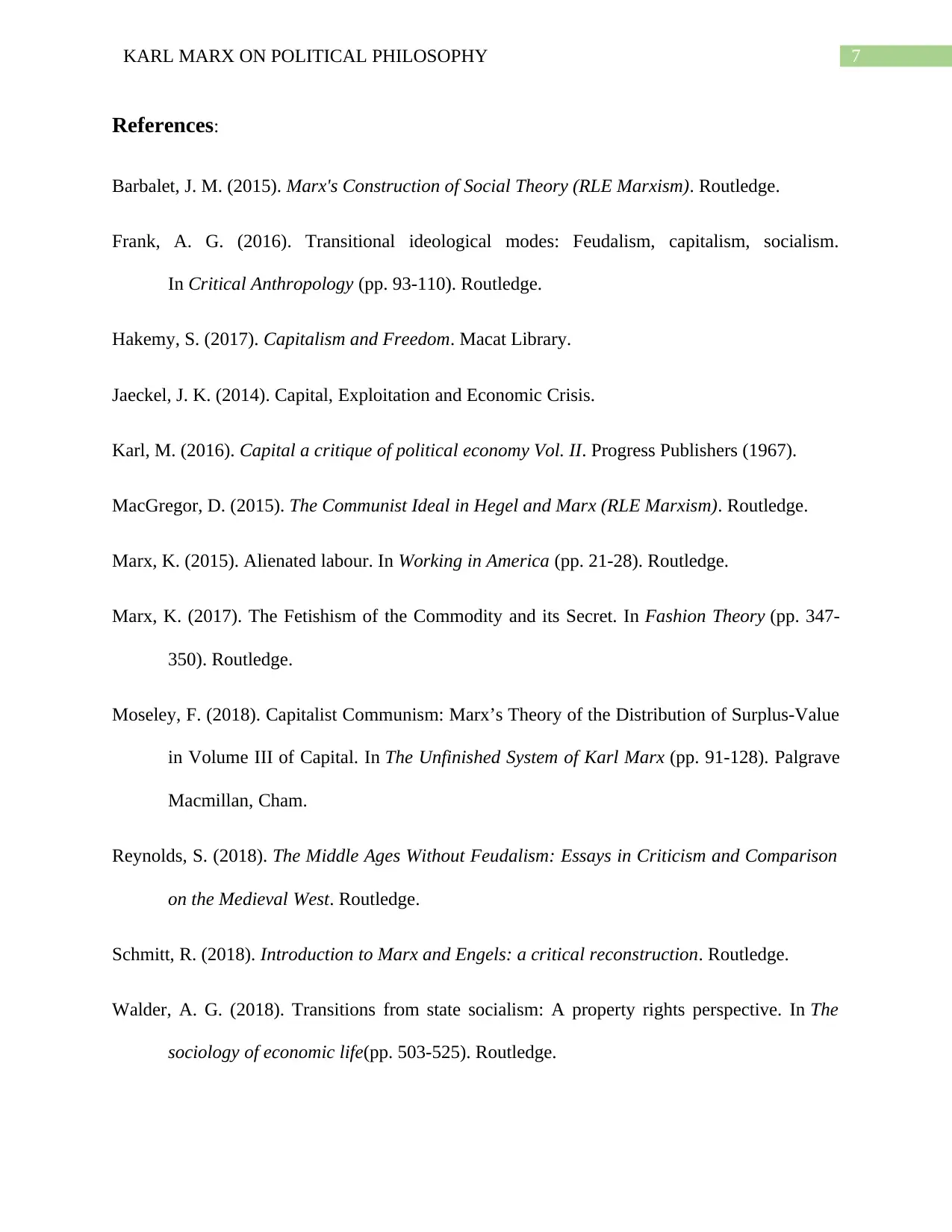
7KARL MARX ON POLITICAL PHILOSOPHY
References:
Barbalet, J. M. (2015). Marx's Construction of Social Theory (RLE Marxism). Routledge.
Frank, A. G. (2016). Transitional ideological modes: Feudalism, capitalism, socialism.
In Critical Anthropology (pp. 93-110). Routledge.
Hakemy, S. (2017). Capitalism and Freedom. Macat Library.
Jaeckel, J. K. (2014). Capital, Exploitation and Economic Crisis.
Karl, M. (2016). Capital a critique of political economy Vol. II. Progress Publishers (1967).
MacGregor, D. (2015). The Communist Ideal in Hegel and Marx (RLE Marxism). Routledge.
Marx, K. (2015). Alienated labour. In Working in America (pp. 21-28). Routledge.
Marx, K. (2017). The Fetishism of the Commodity and its Secret. In Fashion Theory (pp. 347-
350). Routledge.
Moseley, F. (2018). Capitalist Communism: Marx’s Theory of the Distribution of Surplus-Value
in Volume III of Capital. In The Unfinished System of Karl Marx (pp. 91-128). Palgrave
Macmillan, Cham.
Reynolds, S. (2018). The Middle Ages Without Feudalism: Essays in Criticism and Comparison
on the Medieval West. Routledge.
Schmitt, R. (2018). Introduction to Marx and Engels: a critical reconstruction. Routledge.
Walder, A. G. (2018). Transitions from state socialism: A property rights perspective. In The
sociology of economic life(pp. 503-525). Routledge.
References:
Barbalet, J. M. (2015). Marx's Construction of Social Theory (RLE Marxism). Routledge.
Frank, A. G. (2016). Transitional ideological modes: Feudalism, capitalism, socialism.
In Critical Anthropology (pp. 93-110). Routledge.
Hakemy, S. (2017). Capitalism and Freedom. Macat Library.
Jaeckel, J. K. (2014). Capital, Exploitation and Economic Crisis.
Karl, M. (2016). Capital a critique of political economy Vol. II. Progress Publishers (1967).
MacGregor, D. (2015). The Communist Ideal in Hegel and Marx (RLE Marxism). Routledge.
Marx, K. (2015). Alienated labour. In Working in America (pp. 21-28). Routledge.
Marx, K. (2017). The Fetishism of the Commodity and its Secret. In Fashion Theory (pp. 347-
350). Routledge.
Moseley, F. (2018). Capitalist Communism: Marx’s Theory of the Distribution of Surplus-Value
in Volume III of Capital. In The Unfinished System of Karl Marx (pp. 91-128). Palgrave
Macmillan, Cham.
Reynolds, S. (2018). The Middle Ages Without Feudalism: Essays in Criticism and Comparison
on the Medieval West. Routledge.
Schmitt, R. (2018). Introduction to Marx and Engels: a critical reconstruction. Routledge.
Walder, A. G. (2018). Transitions from state socialism: A property rights perspective. In The
sociology of economic life(pp. 503-525). Routledge.
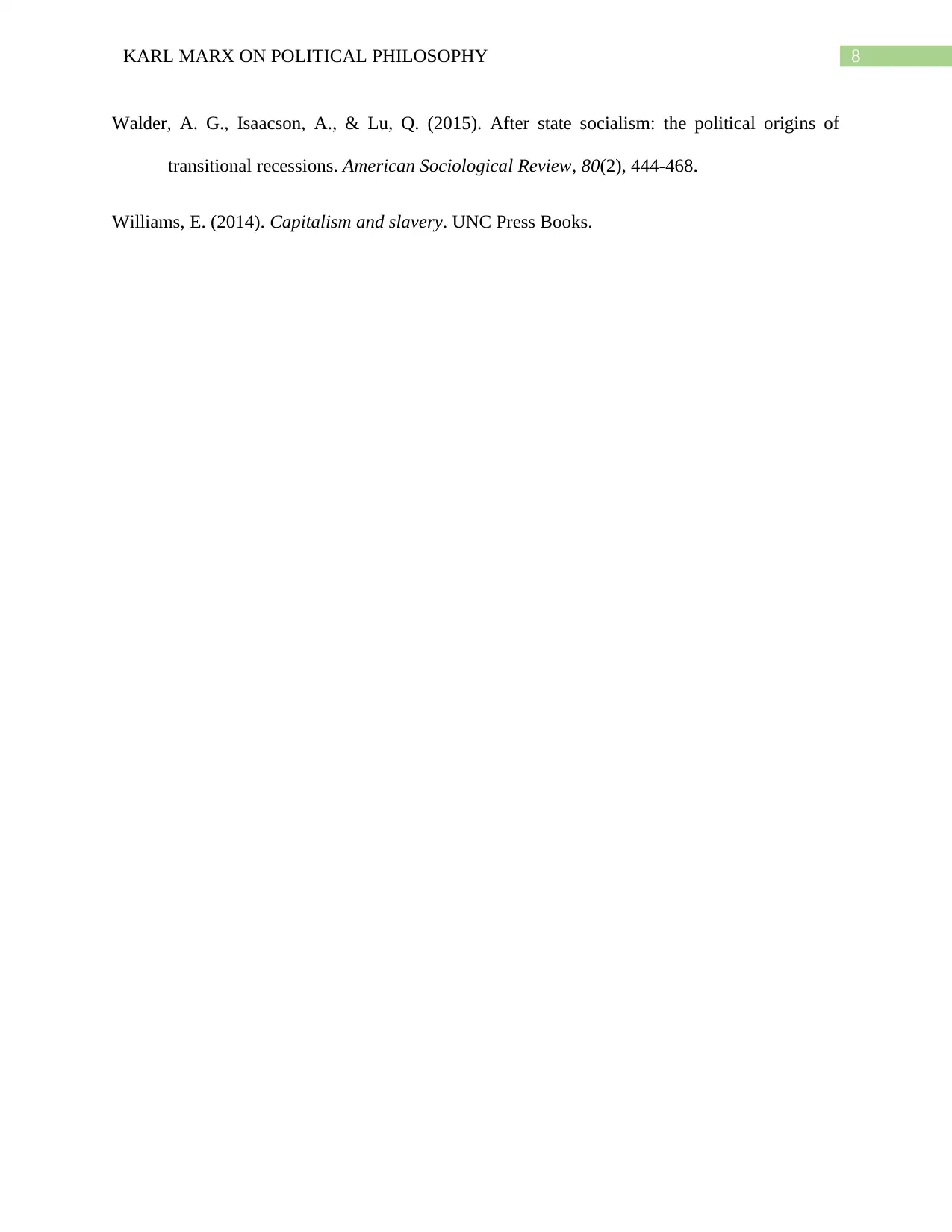
8KARL MARX ON POLITICAL PHILOSOPHY
Walder, A. G., Isaacson, A., & Lu, Q. (2015). After state socialism: the political origins of
transitional recessions. American Sociological Review, 80(2), 444-468.
Williams, E. (2014). Capitalism and slavery. UNC Press Books.
Walder, A. G., Isaacson, A., & Lu, Q. (2015). After state socialism: the political origins of
transitional recessions. American Sociological Review, 80(2), 444-468.
Williams, E. (2014). Capitalism and slavery. UNC Press Books.
⊘ This is a preview!⊘
Do you want full access?
Subscribe today to unlock all pages.

Trusted by 1+ million students worldwide
1 out of 9
Your All-in-One AI-Powered Toolkit for Academic Success.
+13062052269
info@desklib.com
Available 24*7 on WhatsApp / Email
![[object Object]](/_next/static/media/star-bottom.7253800d.svg)
Unlock your academic potential
Copyright © 2020–2026 A2Z Services. All Rights Reserved. Developed and managed by ZUCOL.


